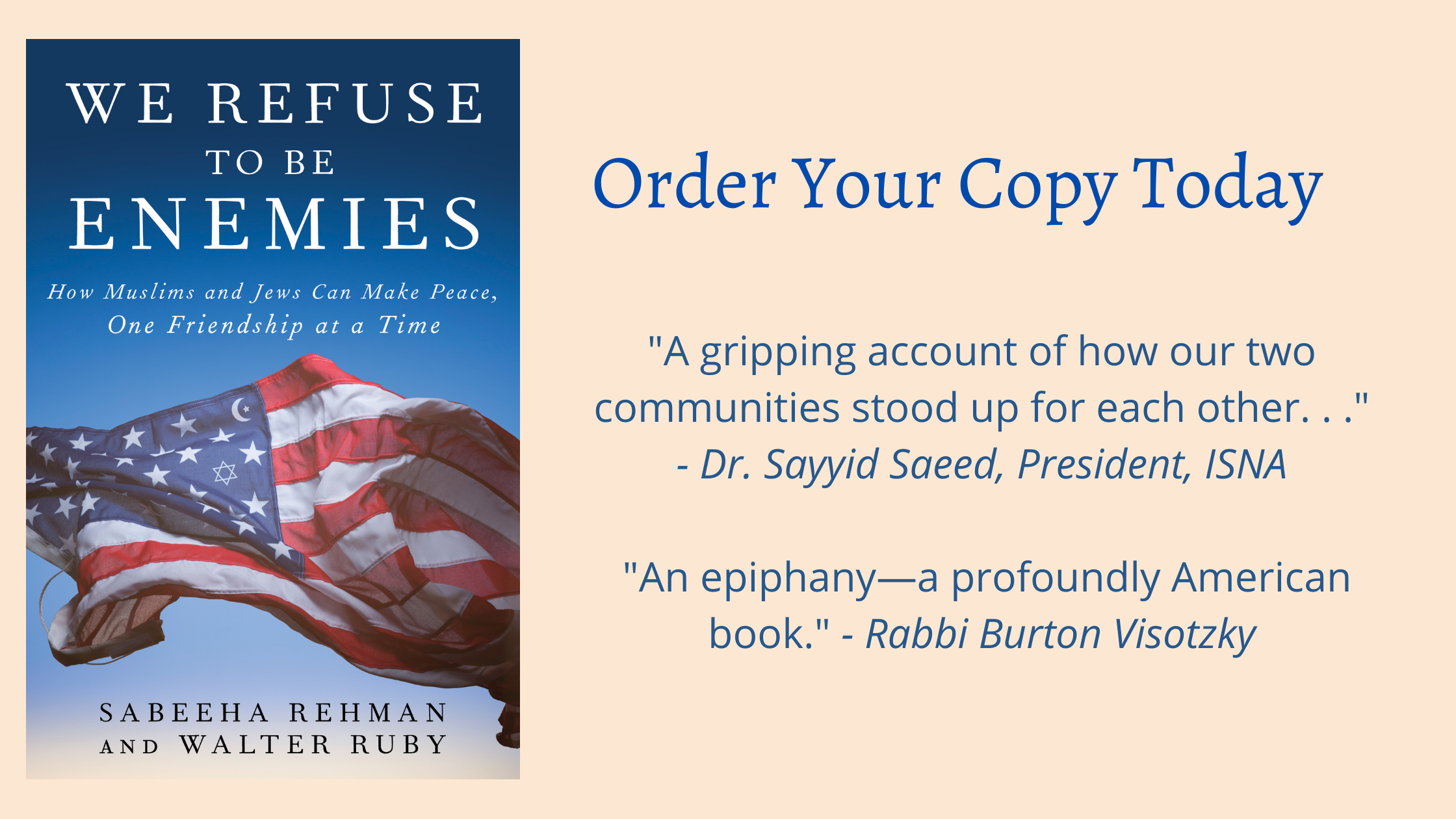This year the Jewish festival of Passover will be celebrated from March 27th through April 4th; and on April 13, Muslims will begin the fasting month of Ramadan. This circumstance occurs only once in three decades, attributable to Muslims following the lunar cycle. As our calendars get populated with interfaith Seders and iftars, we reflect on all that brings us together. Children of Abraham, cousins in faith, and progeny of Ishmael and Isaac, we have more than a shared history in common. The tenets of our faith are what unite us, in particular, four principles common to both Judaism and Islam. In our journey as interfaith activists, we have witnessed the power of these tenets in Muslim-Jewish relationship building.
First is the principle of Sanctity of Life. Both the Talmud and the Quran contain the injunction that whoever saves a life, it is as though he saved all of mankind, and whoever takes a life, it shall be as though he has slain all mankind.
Most Muslims and Jews are not aware that the ‘other’s’ scripture has the same command. It was only when participating in interfaith events, such as one in a mosque which my co-author Walter Ruby attended when a Muslim man was being honored for saving the lives of a group of Jewish men in a subway, and the other at a Holocaust Remembrance Day organized by a group of Muslim women, that each of us heard the speakers quote the same command from their respective texts. There were gasps in the audience.
“It’s in the Qur’an?”
“It’s in the Talmud?”
But then, why are we surprised. After all, it is the same source, the same God.
Second is the principle of Welcoming the Stranger.
The most towering figures in our faiths—Abraham, Moses and Muhammad—were refugees. Abraham made the fraught decision to abandon his ancestral home in Ur and journeyed to the far-off Land of Canaan. During the Passover Seder, Jews remember their history as strangers in Egypt. From the destruction of the First Temple in Jerusalem until the creation of the State of Israel, the dominant image was of the Wandering Jew, passing from country to country, continent to continent. Likewise, when the Prophet Muhammad’s life was threatened, he and his followers quietly left Mecca in the darkness of night, hiding in a cave, and made their way to Medina. The people of Medina welcomed him, and he was able to preach his message of monotheism and establish the first Muslim community. Honoring that history, today Muslim countries top the list of countries of refuge.
When the travel ban was issued in 2017, a rabbi called my husband and asked if he may accompany him to a mosque.
“Should I remove my kippah?” he asked as he entered.
“Keep it on.”
Very noticeably a Jew, he stood shoulder-to-shoulder with the congregants, offering the Friday Jumma prayers. When the prayer was over, people lined up to welcome him and thank him, one of them offering him a gift, a family heirloom—his prayer beads.
Third is the principle of repairing the world: Tikkun Olam in Judaism and Islah in Islam.
Both embrace the concept of repairing the world through the pursuit of social justice and peace building. When my family visits from Pakistan, I take them to the touristy places, but I also take them for a Sabbath service.
“Shalom Aleichem,” they are greeted at the door.
“That is like Salaam Alaikum,” Khalid’s niece says.
Picking up the prayer book, she will exclaim: “This reads like the Qur’an!”
She sways to the music as she watches the congregants sing and dance. When we go out to dinner with my Jewish friends, she makes notes as they orient her on all the places she should experience. She will spend the night writing home to her mom, telling her about her amazing experience and how wonderful these Jewish women were.
There are more than one ways of bringing peace and repairing the world.
Fourth is the principle of Standing Up For Each Other.
In recent years we have witnessed the rise of Islamophobia and antisemitism. Yet, each of our communities have found comfort when the ‘Other’ has stood by us. When the Muslim ban was announced, a rabbi and her congregants from Congregation Beit Simchat Torah in New York City stood vigil outside the Islamic Center of NYU during Friday Jumma prayers, holding posters We Stand In Solidarity With Muslims. For three years, they would come out every Friday, rain or shine, hail or snow; until the pandemic forced the shutdown of Friday prayers.
Then when the tables were turned, it was the Muslims’ turn to stand up for their fellow American Jews. Jewish cemeteries were desecrated, and two Muslim activists launched a crowd funding campaign to raise $20,000. By the time the clock stopped, people had contributed had over $160,000. After the horrific massacre at the Tree of Life Synagogue in Pittsburgh, the Muslim community poured out by the thousands into the synagogue, with their children, and more crowdfunding.
At a time when our nation is bitterly divided, Muslims and Jews need to come together in the interest of safeguarding American values. Together, building on our principles of faith, we can survive, thrive, and contribute to a stronger America.
Happy Passover, and Ramadan Mubarak.
Excerpt from ‘We Refuse to be Enemies. How Muslims and Jews can Make Peace, One Friendship At A Time,’ co-authored with Walter Ruby.
Order from:
A bookstore near you
and
Amazon (hardcover) Amazon (Kindle) Bookshop.org Barnes & Noble Indiebound
Books-A-Million Target.com Walmart.com
Order here on Amazon for your:
Paperback
Kindle
Hardcover
Audio, narrated by Yours Truly
Or look for it on the shelf of your neighborhood bookstore.
As an Amazon Associate, I earn from qualifying purchases
**********************************



